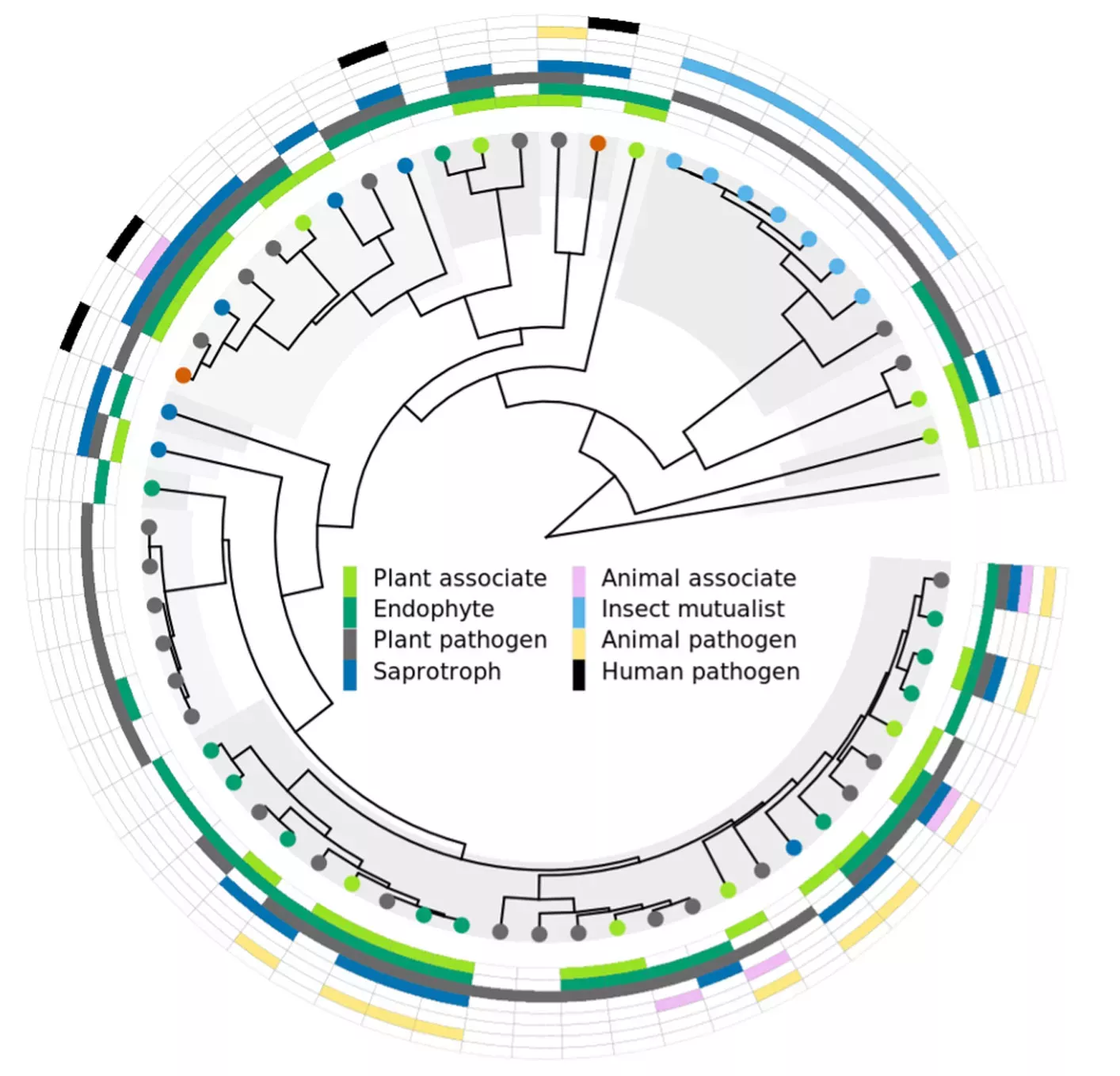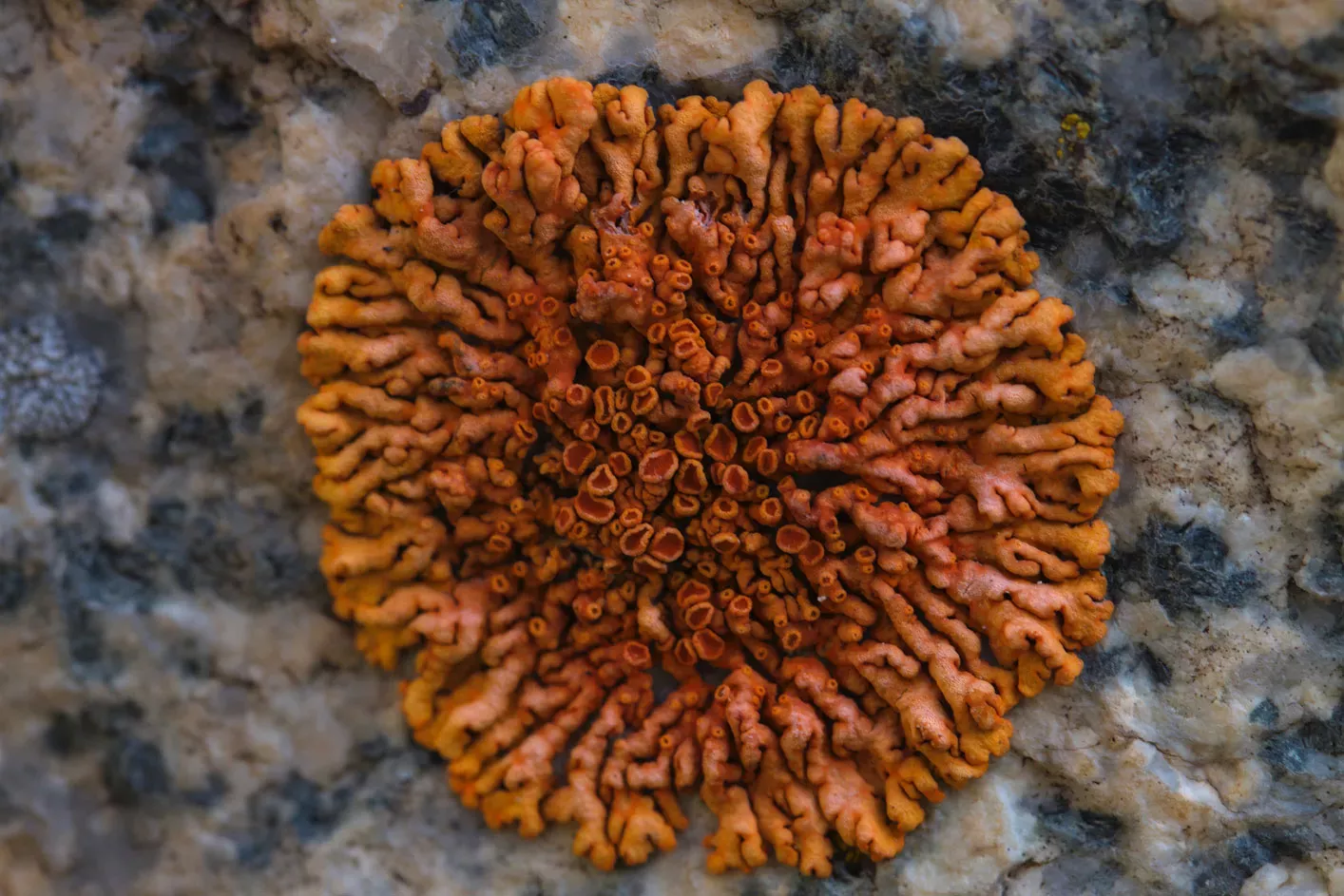Discovering the Fungal Tree of Life
Uncovering the evolutionary history of fungi.

Our understanding of fungal diversity and evolution lags far behind that of the other major kingdoms of life.
Closing this knowledge gap promises unparalleled benefits for humanity.
The tree of life is an essential tool to place each species in the context of its relatives and understand their evolution and properties.
Evolutionary trees provide a powerful tool for prediction, species discovery, monitoring and conservation.
Whereas many parts of the Tree of Life, such as plants, are increasingly well understood, others, such as the crucially important kingdom Fungi, remain largely unknown.
Kew is in an unparalleled position to fill this gap as our Fungarium is home to the largest fungal collection in the world, comprised of more than 1.25 million specimens.
This collection is one of the oldest and most scientifically important in the world.
Advances in genomic tools are revolutionising tree of life research, increasing the volume of data produced by orders of magnitude.
This is opening new opportunities to generate sequence data not only from fresh samples, but also from those where the DNA may be degraded or contaminated, such as preserved specimens of fungi held in our Fungarium collections.
The molecular characterisation of collections is now gathering pace.
The genomes of fungi are relatively small and easy to sequence which increases Kew’s chances of gathering complete genomic data from freshly collected samples and also Fungarium specimens.
The Discovering the Fungal Tree of Life (FToL) project is enabling Kew to unlock the information held in our Fungarium and to establish workflows for sampling and sequencing the DNA of fungal specimens; hence putting the fundamental tools in place needed for a larger-scale programme to reconstruct a global Fungal Tree of Life, including all known genera of fungi.
The predictive nature of the Tree of Life substantially enhances our capacity to understand, manage and exploit the potential of living things, informing and driving the discovery of drugs, foods, biofuels and new materials.
The Discovering the Fungal Tree of Life (FToL) project will help us understand species relationships and how they evolved and will also act as a powerful tool for predicting where the next generation of enzymes, antibiotics or fungal pathogens may appear.
The training of fungal biologists is in decline, hampering our progress on the understanding of this kingdom at a time when it is most critically needed.
Kew is one of the few institutions that sustains a significant fungal research programme, including postgraduate opportunities to train the next generation of fungal biologists.
- To unlock the genetic information held in our Fungarium and beyond: We will implement and develop cutting edge processes to obtain whole genome data from Fungarium collections (‘museomics’).
- To lay the foundations for the complete FToL: We will provide a backbone phylogenomic tree for Fungi including a broad sampling across all major families.
- To demonstrate the potential applications of a full FToL: Produce a fully resolved backbone tree for the phylum Ascomycota and use it as a case study for lifestyle and trait evolution, which will facilitate exploitation of fungal processes and products
- To link our data with citizen science and public engagement: We will nurture and develop Kew’s relationships with citizen scientist mycologists and the general public, in a shared genomic exploration of the UK’s fungal diversity.
PRINCIPAL INVESTIGATORS
PROJECT STAFF
Dr Roseina Woods
Richard Wright
PHD STUDENTS
PROJECT COLLABORATORS
Dr Elena Arrigoni
Dr Alyona Yu. Biketova
Dr Alexandra Dallaire
Dr Brian Douglas
Dr Raquel Pino-Bodas
Dr Tom Prescott
Dr Christine Strullu-Derrien
Kieran Woof
KEW MYCOLOGY ADVISORY TEAM
Dr Martyn Ainsworth
Dr Paul Cannon
Dr Kare Liimatainen
Dr Laura Martinez-Suz
Dr Tuula Niskanen
Lifestyle evolution
Understanding how and why fungi have different lifestyles, such as how one can be harmful to its host and another harmless or even helpful, is fundamental to helping us protect the health of plants, animals and humans.
We can compare the genomes of fungi to explore this question, but using a robust phylogenetic framework is essential to understand how evolution has shaped genetic differences.
FToL provides this crucial phylogenetic context, and will enable a broad perspective of lifestyle evolution across the Kingdom Fungi.
View the pipeline for the lifestyle evolution sub-project

Anthraquinone evolution
Fungi produce a huge diversity of secondary metabolite chemical compounds, which they use to interact with other organisms and their surroundings.
Exploring fungal metabolites has led to the discovery of some of our most potent and effective pharmaceuticals.
However, the secondary metabolism of most of the Kingdom Fungi is poorly understood.
Through comparative genomics and phylogenomics, we are exploring the evolution of a key group of fungal sun-screening pigments called anthraquinones and how fungi use these chemical compounds to adapt to harsh environmental conditions.
Teloschistaceae family and Lecanoromycetes class trees
Lichens represent almost a third of the known Ascomycota.
Despite this, very little genomic data exists for them due to practical difficulties when working with symbiotic systems in laboratory conditions.
To address this, we are developing novel metagenomic approaches to sequence and assemble lichen genomes, which can be used to produce comprehensively sampled, whole-genome trees for lichenised clades such as the large Lecanoromycetes class.
We are also focusing on the Teloschistaceae, one of the most diverse lichen families with over 1000 species, to test our approaches.
The development of these methods will enable us to target traditionally ‘hard-to-sequence’ symbiotic lineages of the fungal kingdom, which will also feed into the work on fungal lifestyle evolution.

Other collaborations
- Evolution and estimation of number of species of Agaricomycetes (Basidiomycota)
- Biodiversity, molecular phylogeny, taxonomy, and species conservation of Boletales (Basidiomycota)
- Taxonomy of the coprophilous genus Poronia (in collaboration with Dr. Andrzej Szczepkowski from Warsaw University of Life Sciences)
Consolidating our network of field collaborators across the country, securing presence in all relevant scientific societies and events in Kew Gardens
To increase the sampling of fresh material and to engage the field community, societies and stakeholders, we are establishing connections with the field mycological community to draw on their skills in acquiring fungal samples of the UK’s unique fungal diversity.
The amateur mycological community holds a wealth of knowledge regarding the identity and whereabouts of our target taxa and are contributing many interesting and useful collections to this project.
To support our collectors, we have developed citizen science tools such as a mobile app and online repository for field and metadata of collections, and training documentation and videos.
Due to the sizeable gaps in fungal education within the UK, it is essential to create links and synergies between the amateur and academic communities that will increase the impact of fungal research.
These collaborations will inspire the next generation of mycologists and deepen our understanding of this exceptional group of organisms.
We are also developing an education plan for schools, inspired by our results and activities, for upcoming outreach events so keep an eye out for updates.
Dr Alan Buddie (CABI, UK)
Prof Pedro W Crous (Westerdijk Fungal Biodiversity Institute, Netherlands)
Dr Cecile Gueidan (CSIRO, Australia)
Dr Isaac Garrido (U. Valencia, Spain)
Manuel Gil (Spain)
Alejandro Huereca Delgado (U. Alberta, Canada)
Robert Lücking (Berlin Botanical Garden and Botanical Museum, Germany)
Troy McMullin (Canadian Museum of Nature)
Dr Marina Termina (University of Haifa, Israel)
Dr Vu Dang Toan (Plant Resources Centre, Vietnam)
We actively seek opportunities to collaborate, and we encourage anyone who would like to work with us to email the team listed above.
